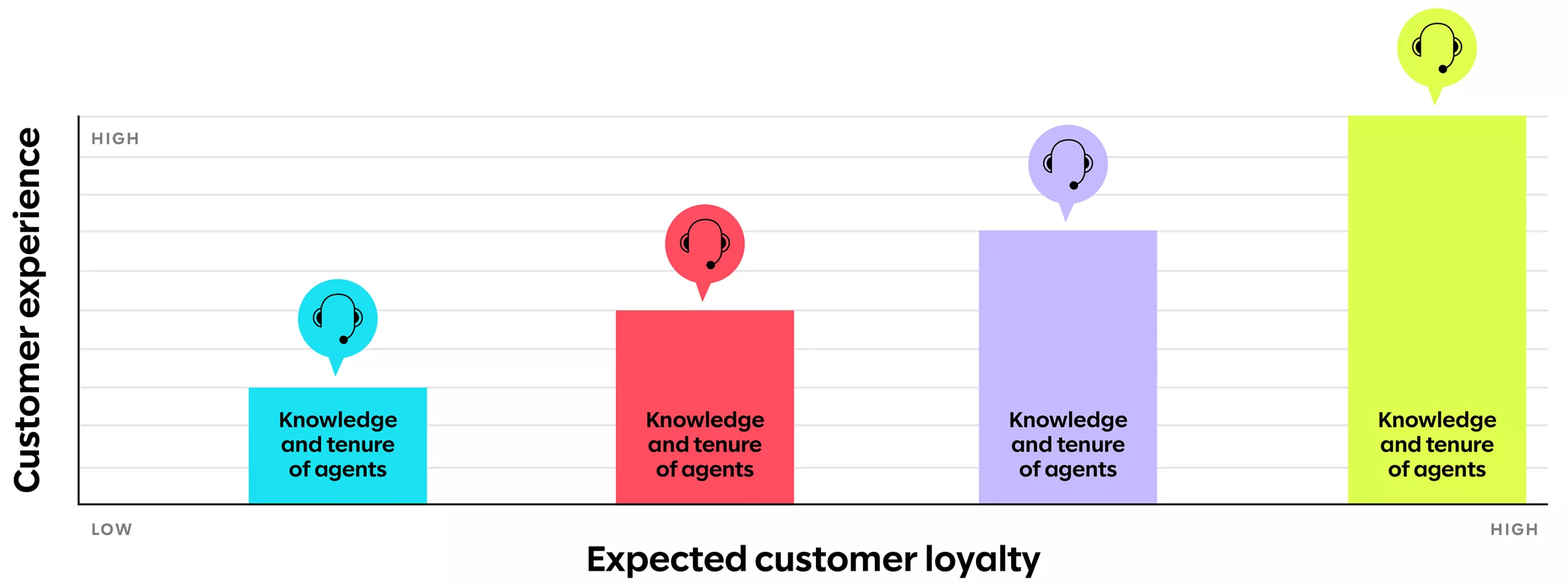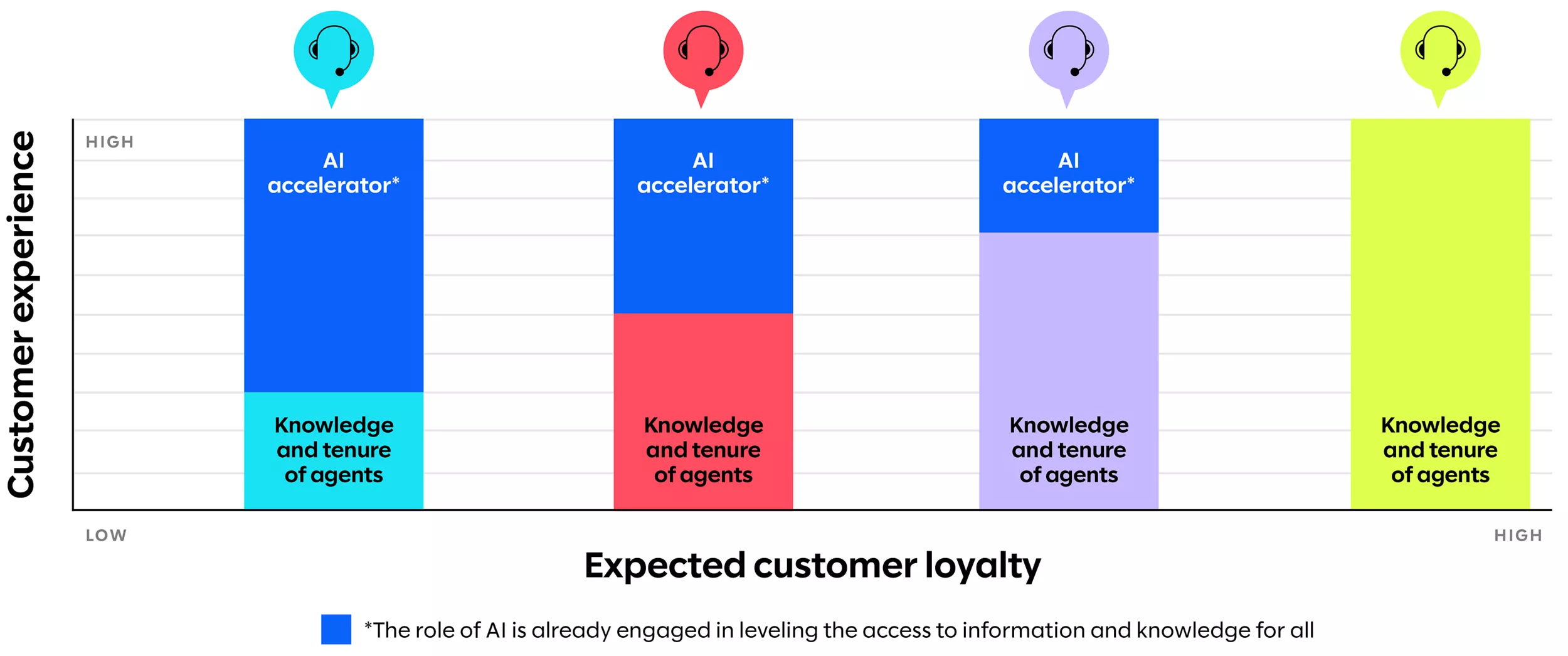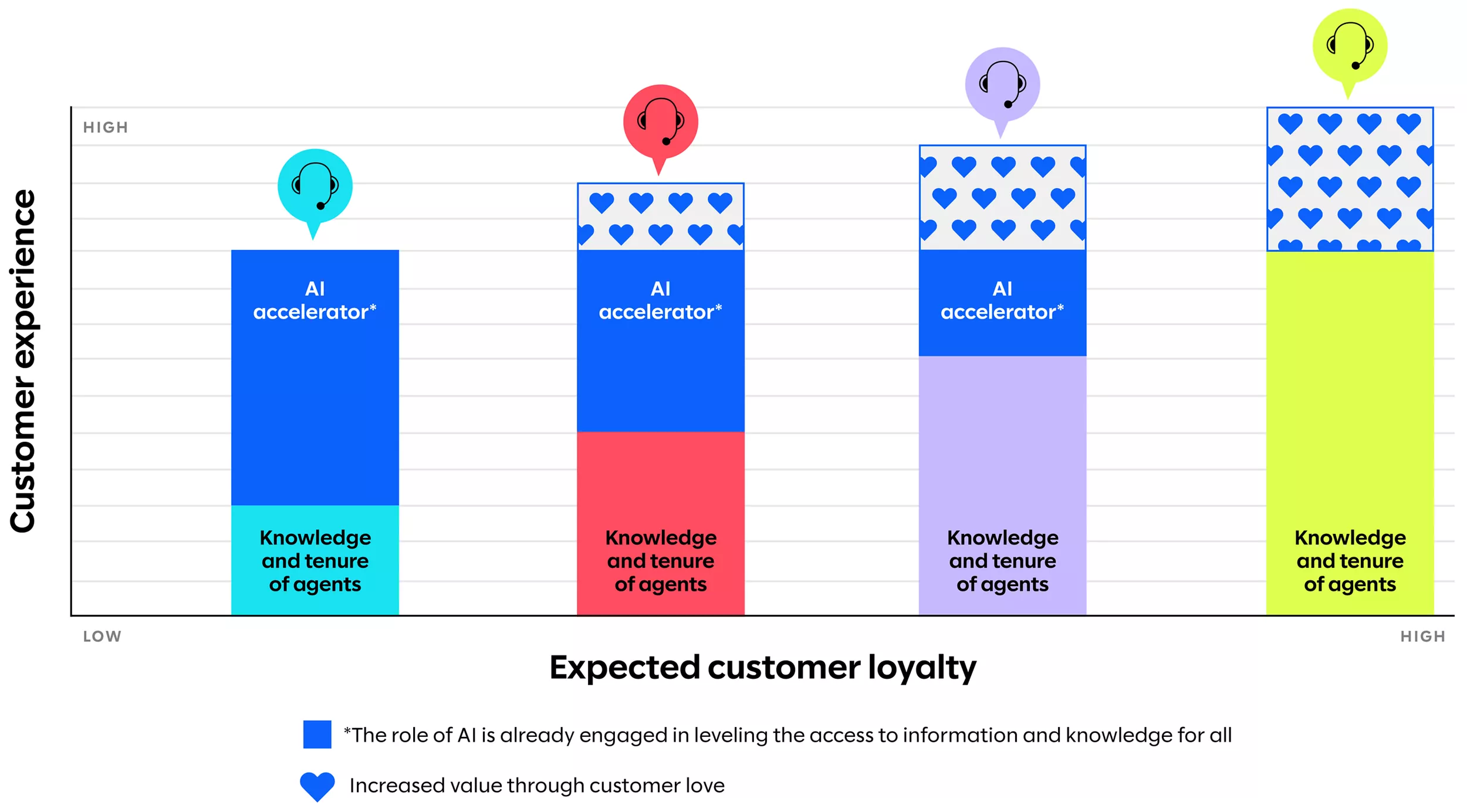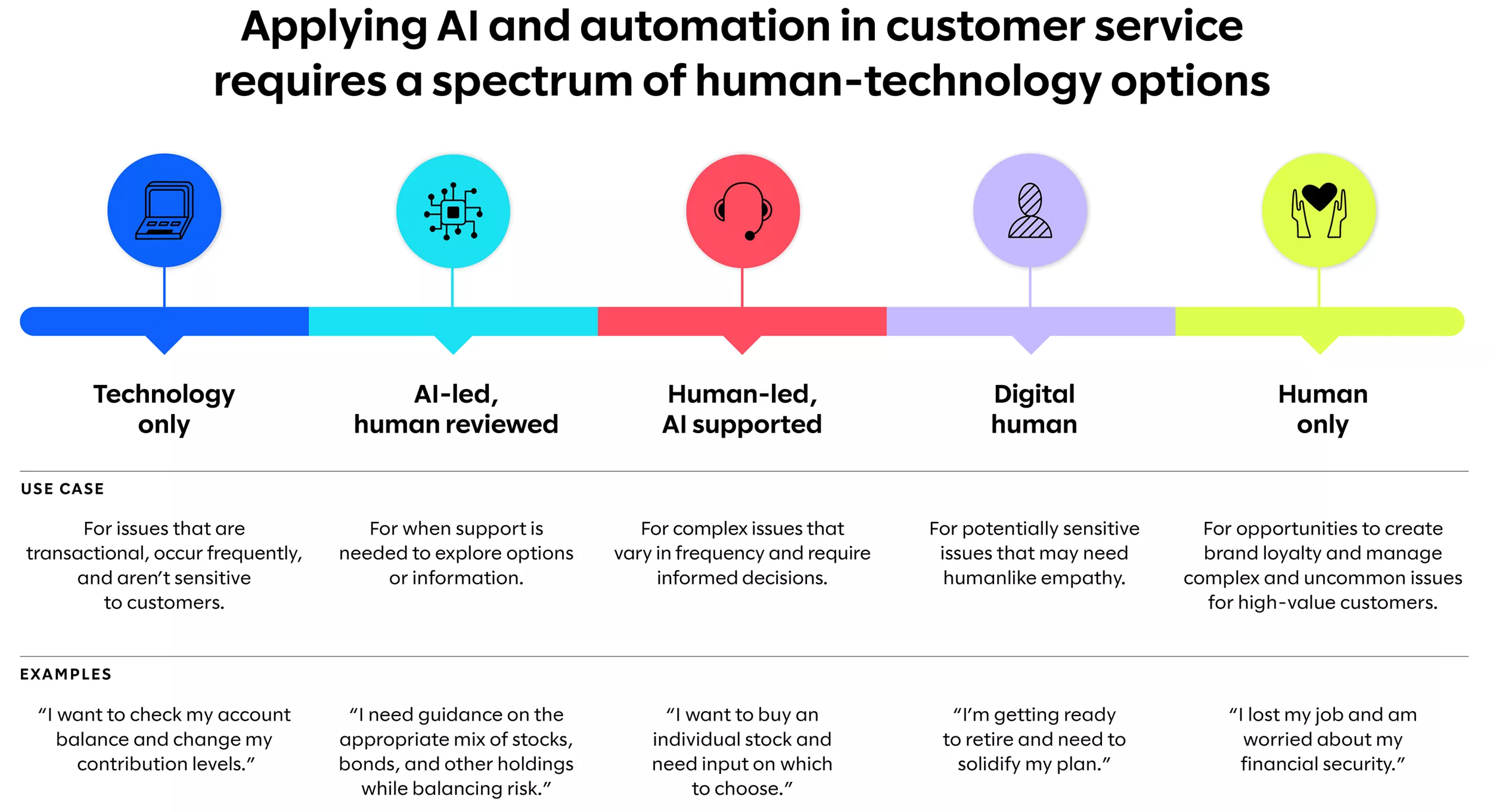How AI is leveling the playing field for customer experience

AI will level the playing field for customer experiences, which means the old ways of retaining customers and holding market share are over. Your new goal? Differentiation through human experience.
You know the feeling of a horrendous customer experience. A canceled flight you can’t rebook in time to make an important event. A lost package that cannot be tracked. Disputing unexpected charges in your utility bill. Poor customer experience feels like an inevitable truth we as consumers need to accept and companies need to mitigate.
At its core, your customer’s experience is based on relationships—with your product or offering, your brand, and the service you provide them. And nowhere is that customer service relationship more volatile—or primed for an overhaul—than in your contact center.
There’s a lot of talk about how AI, particularly generative AI (Gen AI), has the power to fuel this contact center rebirth. These speculations focus mainly on use cases that lead to lower costs and increased simplicity for companies. But this perspective overlooks the real impact of AI, which is how it will fundamentally change the relationship between a consumer and your company. AI is about to level the playing field by giving all your customers a remarkable experience—presenting you with the risk of falling behind or the opportunity to differentiate.
Your contact center is about to change
In today’s world of contact centers, a fundamental truth about managing customer relationships determines how efficiently they’re served. The higher value a customer is deemed, the better the experience they receive through faster access to quality information, typically provided by more experienced agents. The lower the customer value, the lesser the experience—these customers are usually driven to self-service more aggressively. When they seek live support, they are often relegated to lengthier response times and channels such as email, often with a less experienced customer service agent.

For example, imagine you’re a retail executive trying to service your most valuable customers quickly and accurately. To do so, you connect them with the most experienced agents and accurate information that will efficiently solve their problems. This prioritization might mean you ensure they have increased support for finding a lost package and potentially an instant replacement—a better experience overall because of their value to your company.
But what happens to your expected customer service when everyone can quickly access high-quality answers and service due to the inevitable automation through AI?
AI: The leveler of experiences
With AI becoming increasingly better at delivering answers, the traditional notion of ”knowledge is power” no longer holds the same weight it once did. A recent study by Slalom revealed that 70% of executives plan to boost their AI investments in 2024. We predict that a substantial amount—30%-40%—will focus on enhancing customer service through improved access to knowledge and information, emphasizing the urgency for companies to evolve.
Success in customer service will soon be defined by the speed at which AI can deliver experiences for all customers. In your contact center, this means no difference for customers of differing value levels to reach the service they need. With AI enabling answers in seconds, there will be no knowledge or process gap in expertise between your most experienced agent and the new hire, no chatbot delay, and no lack of readily accessible answers on website FAQs. AI will swiftly find solutions from knowledge sources, tailor them to customer needs, and present them at an unprecedented speed, surpassing any current technology or agent.

Companies today are already leveraging AI to close the gap in experiences and services for their customers:
- A global airline is leveraging generative AI to improve traveler communications, generating empathetic messages based on the traveler’s situation.
- A global beauty and skin-care brand uses advanced consumer sentiment and feedback monitoring to deliver personalized content and product recommendations tailored to individual preferences and trends.
- A leading electric vehicle manufacturer is using predictive analytics to identify mechanical issues before they become a problem—even ordering the necessary parts and shipping them to the service center on behalf of the owner, resolving a significant pain point of vehicle ownership.
The days of navigating frustrating phone menus, confusing websites, and endless hold times are over. Once you train your AI on the right and wrong answers, your systems will produce only the correct answers for your customer service organizations, unlike when humans drive all interactions. The new normal will be swift, tailored assistance powered by AI across channels.
As AI levels the field of knowledge across people and companies, what do you do when your old ways of connecting with loyal customers to retain share disappear?
The answer is clear: to stand out in this AI-driven world, you must automate responsibly and focus on creating additional differentiation through the power of humans.
Humans: The amplifier of experiences
Behind every exceptional customer experience is an empowered workforce. With AI helping serve customers more effectively, employees can work on more purpose-filled functions that transform the customer-company relationship. The leveled experience landscape means you need a clear vision and definition of what value your customer service and contact center organizations deliver moving forward. While automation can improve customer service and the agent experience, it is a double-edged scenario: automating everything you can risks eliminating meaningful opportunities to connect with your customers personally. Automating everything you should focuses on automating responsibly: the high-frequency, repetitive customer issues—such as proactively communicating package updates or billing reminders. This focus enables agent time to be spent on more impactful problem-solving and connection.
The impact of employees on customer experiences extends beyond their time allocation; it’s also about the quality of interactions. Consider two important life scenarios requiring customer service interactions. In the first, you experience a death in the family, causing you to cancel a flight. Upon calling the airline, you’re greeted by a human agent who listens, shares condolences for your loss, and quickly issues a refund. In another scenario, it’s your daughter’s 10th birthday, so you order a special present, which is delayed. A human representative sees the inquiry and not only ensures on-time delivery but adds an additional surprise gift.
AI-powered automation can’t drive the empathy and decision-making that only human employees can provide you in these moments. From the employee’s perspective, they can use their time and empowerment to truly affect your life—making each interaction better and more meaningful.
This article was written by Slalom in support of our partnership with Fortune. Visit the Slalom-sponsored AI hub spotlighting the companies using AI to change the world for the better and exploring how technology and innovation can address society’s biggest challenge.

The key to differentiation and creating unique brand loyalty will be defined by intangible assets we call ”customer love”:
- How do customer service representatives make people feel?
- What access do they have to create unique experiences by adding extra perks or benefits?
- What authority do they have to make decisions?
Leveraging AI to improve how customer service employees work is a win-win scenario that initiates a virtuous cycle. A content and engaged workforce translates into improved customer experiences, ultimately driving increased customer loyalty and fostering long-term success. The result? Elevated employee confidence, expedited issue resolution, and satisfied and delighted customers.
Infusing AI with a human touch through digital people
Sometimes, a live person may not be needed, but the human element is enough. Digital humans, when implemented correctly, can offer deeply personalized, empathetic, and humanlike experiences, handling your various customer needs, from product recommendations to technical support.
Digital humans are particularly valuable in sensitive areas like healthcare. They engage with patients for procedural aspects like screening, improving the patient experience, and reducing administrative burdens, allowing medical practitioners to focus on critical tasks.
However, using digital humans comes with the same concerns often raised about AI. According to a Slalom study, this is especially relevant in secure industries such as personal banking, where 57% of people are hesitant to interact with a digital representative due to privacy concerns. However, the study also indicated that individuals are generally more likely to make privacy concessions where the value exchange is transparent.
As trust in these technologies grows, opportunities to expand the scope of digital representatives within your company will emerge. You can currently off-load repetitive tasks onto digital people, striking the appropriate balance between the customer’s expectations to retain a secure yet empathetic interaction and the business objective to leverage AI to reduce operational costs.

A world where customers are always surprised and delighted
Customer service of the future would be nearly unrecognizable to you today. Customers will enjoy constant delight through personalized touchpoints, fast answers, and practical solutions to their problems.
Consider the future of service your contact center provides a spectrum with different blends of human and technology combinations that can solve customer challenges. Differentiation won’t come exclusively through leveraging AI and automation; it will come from how you combine them with the power of humans—their creativity, decision-making, and empathy—making your organization stand out to your customers.

As AI transforms the customer service landscape, you face the challenge of standing out in a world where exceptional service becomes the norm. To start:
- Close the experience gap: Use AI to automate responsibly. Start by curating information into referenceable sources from which agents and bots can answer customer inquiries. Standardize the knowledge to be shared and establish governance to ensure up-to-date information meets your organization’s vision for the customer service experience.
- Identify your differentiator for next-level experiences: When experience is leveled, how will your company stand out? What will you offer customers that no one else can? Where does the potential exist in your business to activate these principles currently, and how will you measure the effectiveness and impact of doing so? Consider the customer issue use cases and how each might be solved with different human and technology combinations and your company's approach to "customer love".
- Empower differentiation through human experiences: Lean into the employee experience, where it can be an engine for customer experience and exceptional service. Leverage your employees’ human decision-making and creativity to deliver authentic, meaningful experiences and ensure you empower and enable frontline brand representatives. Where appropriate – explore supplementing through digital people.
In a fast-paced world where AI will continue evolving and customers will seek more than just answers, human experiences are the lynchpin to strengthening customer-company loyalty for years to come.
This article was written by Slalom in support of our partnership with Fortune. Visit the Slalom-sponsored AI hub spotlighting the companies using AI to change the world for the better and exploring how technology and innovation can address society’s biggest challenge.



